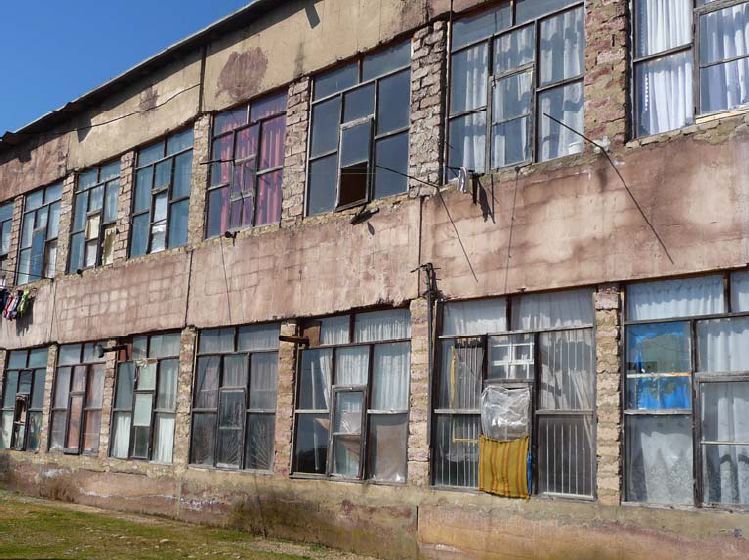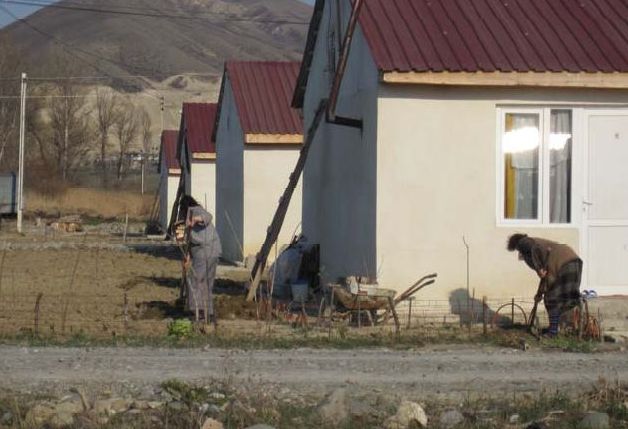 "I do not want charity. I just want to make a living on my own. My husband and I are working on the land every day from twilight to sunset. It is difficult for people like us to sit quietly in a small room and feel ineffective and useless," said Leila, a 70-year-old woman who lives in a place for internally displaced people in Gori.
"I do not want charity. I just want to make a living on my own. My husband and I are working on the land every day from twilight to sunset. It is difficult for people like us to sit quietly in a small room and feel ineffective and useless," said Leila, a 70-year-old woman who lives in a place for internally displaced people in Gori.
Unable to return
About 6 per cent of the population of Georgia (some 246,000 people) are displaced within the country. About 220,000 of these left their homes during conflicts that took place in the early 90s.
Another 128,000 people fled South Ossetia and the Kodori Gorge of Abkhazia during and after the Georgian-Russian war in August 2008. The majority of them have since returned to their homes, but close to 26,000 people are still unable to return, and will not be able to do so in the foreseeable future.
Long-term solutions required
The problem of internally displaced persons was not properly solved until 2007. The Georgian government began to create and implement permanent housing programs with the help of international assistance.
– Despite a heightened focus on the issue, according to Amnesty’s report, the programs sometimes have major shortcomings," said John Peder Egenæs, Secretary General of Amnesty International Norway. "Georgian authorities must ensure that the solutions they come up with are characterized by long-term perspective so that people can go from a "limbo-being" to a normal life again."
focus on the issue, according to Amnesty’s report, the programs sometimes have major shortcomings," said John Peder Egenæs, Secretary General of Amnesty International Norway. "Georgian authorities must ensure that the solutions they come up with are characterized by long-term perspective so that people can go from a "limbo-being" to a normal life again."
– Georgian authorities have established rapid settlement solutions for refugees after the 2008 war, but unfortunately, this efficiency come at the expense of adequate information to and consultation with those affected," says Egenæs.
– Some of the new settlements have also been placed in very rural areas lacking essential infrastructure such as schools, hospitals, shops, government agencies and also jobs," he adds.
High unemployment rates
Many of those who fled their homes nearly two decades ago are still living with family and friends. 42%, however, still live in old and disused buildings, hospitals, sanatoriums, hotels and military barracks. The buildings are often old and lacking access to clean water and a functioning sewage system. Many of buildings are overcrowded and lack privacy.
Unemployment level among this group is up to 70%, and there are still no comprehensive government programmes targeting this issue. Lack of own income has  serious consequences. People are struggling with poverty, malnutrition and health problems because they can not afford medical treatment.
serious consequences. People are struggling with poverty, malnutrition and health problems because they can not afford medical treatment.
“The Georgian government has taken important steps, but housing solutions have to go hand in hand with health care, employment and livelihoods opportunities. This is the only way to fully integrate the tens of thousands of its citizens still living in limbo,” said Nicola Duckworth, Amnesty’s International Europe and Central Asia Programme Director.
Find the new Amnesty’s International report “In the waiting room: Internally displaced people in Georgia” here.
HRH Bergen, based on Amnesty International Norway and Amnesty internetional press releases.





